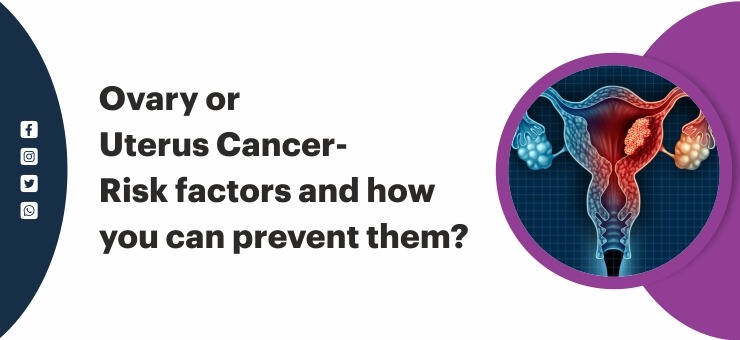Ovary and uterus cancers are two types of gynaecological cancers that affect women. While both types of cancer have different risk factors and symptoms, they can be equally serious if not caught early. Here we discuss the risks of developing these cancers and what you can do to reduce your risk.
Now let us consider Uterus CancerUterus is the womb, the organ in which your baby grows. Cancer that begins in the lining of the uterus is called uterus cancer or endometrial cancer.
Risk Factors for Uterus CancerYour risk of developing uterus cancer increases if:
- You are over 50 years old
- Have a family history of ovary cancer
- Have inherited gene mutations in BRCA1 or BRCA2
- You have never had children
- You had your first child after the age of 35
Ovary cancer can be difficult to detect because the symptoms are often vague and can be mistaken for other conditions. Some of the common symptoms of ovary cancer include:
- Abdominal pain or bloating
- Difficulty eating or feeling full quickly
- Changes in bowel habits, such as constipation or diarrhoea
- Urinary symptoms, such as urgency or frequency
- Fatigue
Uterus is the womb, the organ in which your baby grows. Cancer that begins in the lining of the uterus is called uterus cancer or endometrial cancer.
- You are over 50 years old
- You are obese or overweight
- You have diabetes
- You have hormone therapy for menopause
The most common symptom of uterus cancer is abnormal vaginal bleeding, such as bleeding between periods, bleeding after sex, or postmenopausal bleeding. Other symptoms may include:
- Pelvic pain or pressure
- Pain during intercourse
- Abnormal vaginal discharge
- Difficulty urinating
There is no guaranteed way to prevent ovary and uterus cancers, but you can take these steps to help reduce the risk.
Maintain a Healthy Weight:Being overweight or obese can increase your risk of developing uterus cancer, so it is important to maintain a healthy weight through a balanced diet and regular exercise.
Think twice about Hormone Therapy:Hormone therapy can be an effective way to manage menopause symptoms, but it also carries a risk of uterus cancer. If you are considering hormone therapy, talk to your doctor about the risks and benefits.
Get Screened:Regular gynaecological exams can help detect ovary and uterus cancers early, when they are most treatable. Check with your gynaecologist on when and how often you may need screening.
Know Your Family History:If you have a family history of ovary or uterus cancer, you may need a genetic counselling and testing to determine if you have an increased risk for these cancers.
Quit Smoking:Smoking has been linked to an increased risk of ovary cancer, so quit smoking and avoid exposure to second hand smoke to reduce your risk.
Eat a Healthy Diet:A diet that is high in fruits, vegetables, and whole grains and low in saturated fat and processed foods can help reduce your risk of developing uterus cancer.
Exercise Regularly:Regular physical activity can help maintain a healthy weight and reduce your risk of developing uterus cancer.
Gynaecological cancers are best managed when they are detected and treated early. If you suspect you may have a gynaecological cancer, consult the best oncologist at Zanish Cancer Hospital. Our cancer specialists provide accurate diagnosis and treatment for all cancers.






